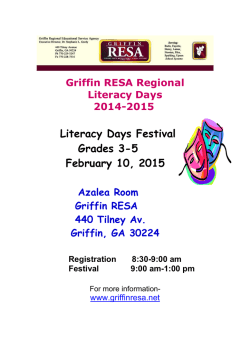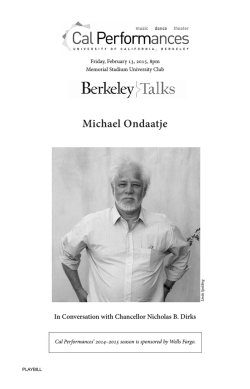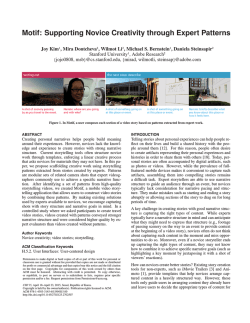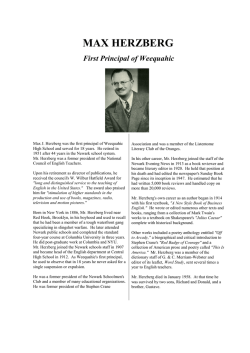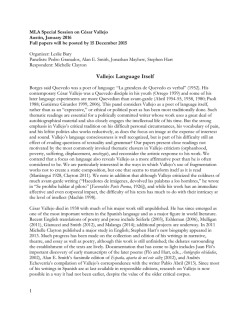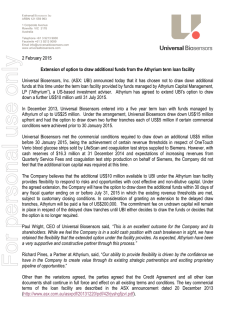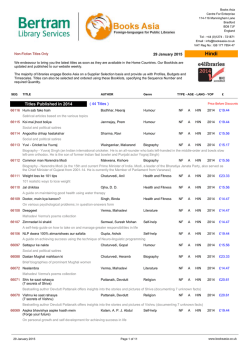
Literary Terms for Anglo
Using the literal translation on the right, see if you can identify any words or word roots in the Old English. Translation 1: Trying to be as literal as possible Old English: Oft him anhaga are gebideð, Often the one dwelling alone || mercy awaits for himself metudes miltse, þeah þe he modcearig the creator’s kindness || although he is sorrowful at heart geond lagulade longe sceolde through the water path || a long time he has been obliged to hreran mid hondum stir with his hands || the frost cold sea-- hrimcealde sæ, wadan wræclastas. Wyrd bið ful aræd! Swa cwæð eardstapa, (5) travels the paths of exile || Fate is fully determined. Thus said the earth-stepper, || hardship remembering, earfeþa gemyndig, wraþra wælsleahta, winemæga hryre: of grievous slaughter, || dear kinsmen’s deaths. "Oft ic sceolde ana uhtna gehwylce "Often I am obliged alone || each dawn mine ceare cwiþan. Nis nu cwicra nan to lament my sorrows. || There is not now anyone alive þe ic him modsefan minne durre sweotule asecgan. þæt biþ in eorle (10) Ic to soþe wat indryhten þeaw, þæt he his ferðlocan healde his hordcofan, fæste binde, hycge swa he wille. to whom my heart || I dare openly express. || Also, I truly know that it is in a warrior || a very noble custom that he his inner thoughts || should bind fast, contain his treasured thoughts, || think as he wishes. Translation 3: Tim Romano Compare the translations presented here with the one you read last night. Analyze the differences. What is lost or added in each one? Why might the poets have made these decisions? What were they trying to emphasize? Translation 2: Charles W. Kennedy Oft to the Wanderer, weary of exile, Cometh God’s pity, compassionate love, Though woefully toiling on wintry seas With churning oar in the icy wave, Homeless and helpless he fled from Fate. Thus saith the Wanderer mindful of misery, Grievous disasters, and death of kin: "Oft when the day broke, oft at the dawning, Lonely and wretched I wailed my woe. No man is living, no comrade left, To whom I dare fully unlock my heart. I have learned truly the mark of a man Is keeping his counsel and locking his lips, Let him think that he will! A haven awaits the homeless soul waters serene though wretchedly on the ocean's lanes long must he work the oars in a wintry sea fare as a fugitive. Fate has been decreed. So said the exile anguish recalling ruthless killings how his kinsmen fell. All alone early each morning I mourned my loss. There's not a man alive that I dare tell my tale to him the whole truth. I have to admit that it is in a man an admirable thing that he keep his soul's coffer shut hold onto his hoard have in heart what he will. SOPHOMORE LITERARY ELEMENTS & LANGUAGE TERMS Old English Poetry Terms and Concepts Alliteration* Repetition of the initial letter at the beginning of words in a phrase or sentence. Old English Poetry usually has two alliterating words in the first half line and one in the second. For example: Ic eom weorð werum wide funden, Brungen of bearwum ond of burghleoþum, of denum ond of dunum. Dæges mec wægun Caesura A pause or break in the middle of a line. Old English poetry is divided into two half lines per line. Each line tended to have four stressed syllables, two on either side of the caesura. Comitatus The Anglo-Saxon social structure consisted of tribal units led by chieftains (“kings,” or “lords”) who, theoretically at least, earned their respect from their warriors (or “retainers,” or “thanes,” the group being called a “comitatus”). Kings should display the heroic ideal and be known for an extraordinary and courageous feat or for success in war, all preceded by some boasting. The king must be a generous “ring-giver” too -- that is, he must dish out the spoils of war to his thanes rather than hoard the treasures won in tribal warfare. The thane shouldn’t survive the king (if your lord was killed and you retreated from the battlefield, you and your family were disgraced forever), and the worst fate was to be exiled or to outlast all one’s fellow warriors. The sense of identity came from the warrior community. Elegaic Poetry A type of meditative poetry that laments the death of a person, a belief, a way of life, etc. Example: “The Seafarer” Kenning A kind of mini-riddle, usually two or three words (often involving a hyphen) that function in a metaphorical way; they replace a more concrete noun Example: “feeder of ravens” = warrior (because ravens are notorious for eating the dead on the battlefield) Litotes* A deliberate understatement for effect; the opposite of hyperbole; usually accomplished by the negation of an antonym; found frequently in Old English poetry Example: “not half bad” = a good idea; “no small feat” = a difficult task . Ubi Sunt (Latin, “Where are they?”): A literary motif dealing with the transience of life. The name comes from a longer Latin phrase, “Ubi sunt qui ante nos fuerent?” [Where are those who were before us?], a phrase that begins several medieval poems in Latin. The phrase evokes the transience of life, youth, beauty, and human endeavor. Many Anglo-Saxon poems such as “The Seafarer” and “The Wanderer” deal with this theme. Although the motif is similar to the Roman carpe diem motif in its emphasis on transitory existence, the medieval ubi sunt motif usually does not call on the reader to embrace this world's pleasures before the end comes, but instead grimly or sorrowfully urges the reader to prepare spiritually for the afterlife.
© Copyright 2026

